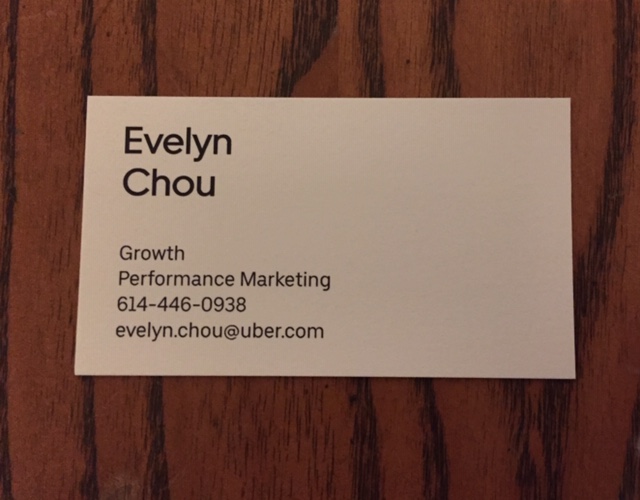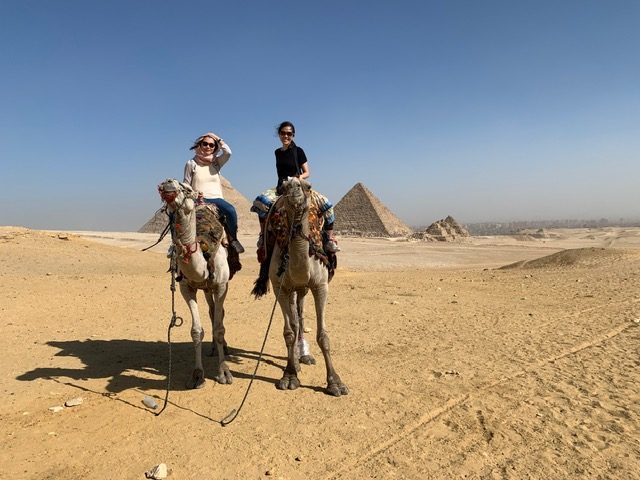Reflections on My Uber Layoff
This is not a story about success. Rather, it’s one about failure and how I picked myself up from where I fell. About three months ago on Monday, October 14th, Uber downsized for the third round, and my whole team was affected. I remember the out-of-body, surreal feeling after being called to a mandatory but vague meeting only to find out that my role at the Performance Marketing team in the DC office no longer existed. After ~2.5 years of pouring my efforts and energy into the job, the “farewell and thank you for your service” was only 60 seconds long. People say that layoffs are not personal. Why it happened, indeed, is not. But how you internalize, interpret, and interact with the consequences definitely are.

Some of my friends who went through the first round of layoffs told me about the five stages of grief (denial, anger, bargaining, depression and acceptance). For me, it was a totally different experience. In the moment, I deliberately suppressed my desire to scream or cry and went straight to action. “What will happen if this project that I have been working on for months is left undone?” “Whom should I say goodbye to?” “What’s next? Did I capture everything that I needed in the exit meeting?” I managed to take care of as much as I could think of–including notifying collaborating teams, providing transition plans and contacts, and embracing myself to send out a “thank you & goodbye” emails–before dragging myself out of the Uber building. Upon getting home, I lost all my energy, crumpled to the floor, and started sobbing.
Just as many who went through a similar workforce restructuring process would describe, the next days and weeks felt like a roller coaster ride. After I finally calmed myself down, I worked up an optimistic angle to the layoff. I am going to make this the best comeback story! This could be my TEDx talk about resilience and perseverance! The next day everything went the opposite direction. I woke up not knowing what to do or where I should go. I sat in front of the computer browsing job posting and trying to figure out my next steps. Fortunately, there are so many wonderful people and communities that once I allowed my vulnerability to sink in and openly asked them for help, I received it. I was overwhelmed with people’s kindness and acceptance. Touched, I was even more motivated to get into a position that I can pay it forward and help encourage others in the same situation.
The path to finding a new job, of course, wasn’t all that rosy. While I was deeply inspired by my friends, family, and former colleagues, I also experienced rejection and lack of sympathy from those I considered pouring my heart out to and working tirelessly for in the past. The search process itself is another battle. Some days I felt optimistic after speaking with recruiters, later (usually after complete silence, no matter how many times I followed up) I either got a rejection letter or a non-committal response, if I was lucky. Most jobs I applied for felt like looking for a needle in a haystack.
Over the course of two months, I applied for more than 50 jobs, got a couple dozen rejections, and didn’t even hear anything back from many. I learned a great deal about my emotions, which changed on a daily basis based on the responses (or lack thereof). I was able to find a pattern out of the search process. I squeezed in some activities I would otherwise not being able to do had I have a full-time job. I served on jury duty for the first time, attended a cybersecurity policy discussion, helped out reviewing people’s resumes at a career workshop (shocking, right?!), and visited Cairo and Luxor in Egypt.

Now that I am towards the end of my search, I would like to share a few lessons that I learned from this experience. What prompted this post is not about remorse or pride, but a reflection of our society’s lack of discussing these psychological taboos and the strengths that we can all find within and around those who are caring.
- Be a polymorph. Find your identities: Uber has been my halo. I always felt that working there was the best thing that happened to my career because the company was creating technology that changes people’s lives. When I lost that halo, I lost myself. I felt worthless and ashamed. It took me a while to acknowledge other things I commit to and feel passionate about, such as immigration issues, women’s rights, equality, and mentoring. Only when I objectively look through the lenses of these causes I’ve devoted myself to did I separate myself from one loss to embrace these other identities I have as an advocate, learner, and connector.
- Be an optimist (and a realist): William Ward once said, “the pessimist complains about the wind; the optimist expects it to change; the realist adjusts the sails.” When I started my job search, I had three Uber internal positions in mind. Going back to where I felt comfortable seemed like a natural decision. But as I had a few more competing offers a few months later, I had to think hard about my decisions and tradeoffs. Which opportunity scares me the most? While I am certain I could hit the ground running in no time had I returned to Uber, it was the learning and additional responsibility and scope that I had been longing for.
- Establish a routine: This is probably one of the most important pieces of advice that helped me land on my feet quickly. The shock of being laid off eventually eases, but the habit of getting up and going to a workplace sets the tone for the day and profoundly impacts our mood and ability to adapt. My therapist’s advice was to be active, stay connected, and go outside. So I came up with a new routine: wake up around the same time, check emails and apply for jobs online, and go workout in a nearby gym that requires me to physically be out of the door for at least 2-3 hours. My afternoon is usually filled with information interviews, catch-up phone calls, or occasional networking events. By having a new routine, I was able to discipline myself to not dwell on things outside of my control and focus on staying in touch with a variety of activities that helped me through the process.
- Be gentle to yourself. Capture your feelings through journaling: In the first few weeks after being laid off, I would feel ashamed and small. Especially when my husband accidentally told his networks about my situation, I went into an emotional outbreak because I didn’t want to feel pitied by those whom I don’t even know. One evening I came across Susan David’s TEDx talk “Emotional Agility”. She talked about life’s beauty being inseparable from its fragility (and man was I fragile then) and that we owe it to ourselves to be vigilant of our emotional accuracy. Am I a “failure”? Or is it more of a “disappointment” as a result of unwanted separation? Another great article in the same vein, Do You Ever Feel Like You’re Not Enough, also has some healing advice on how to be strong during the transition.
Lastly, accept your vulnerability and ask for help. While it’s very easy to crawl into my own little cocoon and dwell on the what-if’s, I find vulnerability liberating. Admitting what happened allows me to move forward and carve out a new path. Even though some people may not know how to respond to your situation, most people, including strangers, are rather kind and eager to help. Were it not for reaching out for help, I would not have the opportunity to volunteer at a SIMCAC (Society of Information Management) event where the topic covered diversity and professional development. One speaker asked the audience how many have been laid off in their career, and I saw more than half of the people in the room raised their hands. That brought tears into my eyes. I am not alone, and neither are you.
A good friend and mentor of mine, Nadia Anderson, called being laid off an “adulting” experience at its finest. I’ve learned so much in the past three months. And I am excited to join Lockheed Martin in the Performance Measurement, Strategic Planning and Operations team. I will be building a team from scratch and redefining their data strategy. I would not have been able to achieve this alone.
As Ulysses S. Grant put, “the friend in my adversity I shall always cherish most. I can better trust those who have helped to relieve the gloom of my dark hours than those who are so ready to enjoy with me the sunshine of my prosperity.” I would like to especially thank the following people: Maggie Duvall, Nadia Anderson, Jin Yan, Megan Malley, Meg Donovan, Kathy Mok, Bernard Coleman, Shreyas Kumar, Erica Bunker, Wendy Wen, Ishita Kundo, Leah Spix, Ann Cheng, Greg Johnson, Katie Gonzalez, Sam Laforet, Osman Masood, Sarah Krestool, Camiel Irving, Molly Vorwerck, Cory Miller, Jill Garcia, Amy Wang, Katie Van Leeuwen, Charlotte Kelly, Shiyao Guan, Theo LeCompte, Diana Lin, Mike Leiken, Karina Sengupta, Supriya Balachander, Fiona Cummings, Jen Caffrey, Alison Crawford, Bob Rupp, Taran Reese, Nadim Hossain, Andy Jeninga, Kevin Huang, Sarfraz Maredia, Thomas Pan, Catherine Sweitzer, Alanna Tondi, Aga Brown, Ankit Misra, Richard Copeland, Nancy Dimaio, Sonia Arenaza, Khuloud Odeh, Edima Elinewinga, James Parks, Kara Freeman Lee, Derrick Butts, Priyanka Komala, Deb Hyun, Alex Raymond, Liz Kennedy, Kristy Reynolds, Nina Brownstone, Ryan Namata, Teresa Wong, Stan Fujii, Vin Pineda, Shayne McAllister, and my Equinox family.


